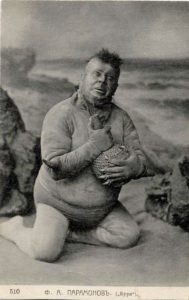Well I’m happy to report that Julie Taymor’s The Tempest movie was in fact playing at one theatre in Boston, so I hiked into town to watch it just like I said I would. As Bardfilm put it, the fact that we’re seeing more Shakespeare on film these days at all is a major accomplishment and we need to support it.
SPOILER ALERT : This post contains specific details about the movie. So if you really want to be completely surprised by every directorial decision, you probably don’t want to read this.
Unfortunately I have to say that this movie had some good, a bunch of bad, and some decisions that were so downright terrible as to be insulting.
Open with a sandcastle, dissolving in the rain. Miranda, who made the castle, sees the storm, sees the ship. Begins running. Then we get the shot of the men on the ship, cutting back periodically to Miranda running. I liked the tempest itself. The sound mix was terrible and you could not hear much of what was said – I’m pretty sure that most of the good lines (like Gonzalo’s “acre of dry land” speech, and the “he hath no drowning mark upon him” line) were both cut. But here’s the thing – it was a good storm. We see fire, we see waves crashing completely over the boat, we see men going overboard. You watch this brief scene and you think, “This ship is going down, these men are all going to die.”
Cut to our first shot of Helen Mirren’s Prospera, who is actively controlling the storm. This could have been awesome – at how many spots in Shakespeare’s script do you get to say “I think Prospero is actually spellcasting here”? Unfortunately, the spellcasting in this case is Mirren holding her staff over her head and screaming. No words, no ancient incantations, just screaming. Until Miranda stops her.
Here I think an opportunity was missed. I would have loved to see something from Mirren to signify that, until a moment ago, she’d been on some different, magical plane, her entire awareness focused on nothing but the spell she was casting. A few moments of confusion, staring at her child and having to take a moment to come back to reality. After all she was just screaming her head off. Instead we get something more of a “What do you want, child? Mommy’s working!” moment. Miranda gets the same look from Prospera that my 6yr old gets from my wife when my wife’s trying to talk on the phone.
First real annoyance, though? We get an invented backstory for Prospera. This isn’t just a case of swapping out some gender pronouns in the script. No, we actually change the story. Prospera is the *wife* of the Duke, you see. So then when the Duke dies, she signs over control of the dukedom to her brother Antonio. This was troubling to me, because by doing that you split the universe we Shakespeare geeks know, and you move from a gender-bent Prospero (which we can understand, we’ve all seen gender-altered productions) to “No no, this is a whole different character.” Well, then, what do you expect me to do with that? How can I have any expectation about a character you’ve invented?
I can’t really do the whole story at this rate, the post will be 10 pages long. So let’s get to the good/bad/awful, shall we?
The Good
Prospera’s relationship with Ariel. I loved this. Every interaction between the two shows Ariel at Prospera’s shoulder, so close that they’d be rubbing against each other – a confidant and friend, not a servant. Ariel is human, and the same size as Prospera (more on this later). You really got the idea that these two were a team, and when Prospera says “I will miss thee” you know she means it. However, this did not come across as well as it could in the various spots where it could have – especially “Do you love me, master? No?”
Ariel is entirely a special effect. Well, I mean, he’s a male actor, in the form of a male actor, for the most part. But he’s got a CGI-enhanced white glow about him when he’s standing still. And when he’s not, he’s zipping aerily about, feet never touching the ground. This only makes sense. Ariel can’t be just another character like Caliban, there needs to be something other-worldly about him. Her. It. More on this later.
I thought Miranda and Ferdinand were acceptable, at least as far as their delivery went. I saw some reviews that thought the two young actors were out of their league, but honestly I though that they played the role well – they’re children, after all, and they’re not really major characters in the story. Their entire purpose is to make big sappy doe eyes at each other and tell each other they’re the moon and the stars. Ferdinand’s *look*, on the other hand, will make you question WTF Prospera is thinking setting her daughter up with this kid. Long hair hanging down in his face, and this really stupid mustache that looks like something a 13yr old could grow. No idea why they gave him that look. Oh, and remember the scene where he sings? Yeah, I didn’t think so. More on that later.
The Bad
The movie is mostly special effects – and they are bad special effects. Fans of theatre over film here will have a field day – some things are better left to letting Shakespeare paint the picture. When Ariel speaks of how he sank the ship? It’s a very descriptive scene, yes. So did we really need to replay it, showing a giant Poseidon-like Ariel literally flicking the ship back and forth with his fingers while he told the tale, like a child playing with toys in the bath tub? Most of Ariel’s special effects are a bit off. Remember, Ariel is basically just a person – but his feet never touch the ground. So several times when he has to leave the scene, there’s a special effect of him running across the sky, up into the clouds. Not a swoosh or a blur or anything, a person with legs running away, who just happens to be running up up and away. I thought it looked stupid.
Another weird one? Prospera’s cell is something out of an MC Escher painting, for who knows what reason. I mean, yeah, sure, it’s a cave carved into the side of a mountain, so of course it’s all entirely right angles. Makes sense??
Some parts just did not seem well thought out. You know how Trinculo, Stefano and Caliban are delayed on their way to kill Prospero when he lays out all his nice clothes to distract them? Yeah, well…how’s that scene play out when Prospera is a woman? Well, she lays out a bunch of beautiful dresses. And Trinculo and Stefano get all excited …and dress up in the women’s clothes. WTF?
Oh, I said I’d mention this — Ferdinand sings. For some unknown reason he breaks into the Clown’s number from Twelfth Night, the one that contains the big “Journeys end in lovers meeting” line. Had a very weird, Across The Universe vibe to it. I kept thinking I wanted Prospera to roll her eyes and say “Oh, sh_t, he’s in a *band*?! This was a bad idea.”
Russell Brand. Yeah, what can I say, I hated him. The whole scene on the beach where he climbs under Caliban’s blanket and is first discovered by Stefano? That scene was pretty painful to watch, it just did not work on any level. Well, I take that back, Caliban had a great “WTF is going on?!” look throughout the whole thing. And toward the end of the scene, Stefano and Trinculo did manage to give off this really nasty “These aren’t just buffoons, they’re criminals who are capable of serious harm” vibe that I don’t usually see. But Brand’s delivery of the material? Well, it’s on a different level, I’ll say that. It’s really and truly like Brand wanted to take it and run with it, do his own thing. Lots of mannerisms added to the character. More on that later.
The So Bad It’s Insulting
Trinculo and Stefano can both be heard quite clearly saying “F_ck.” That annoys me on an infinite variety of levels. In both cases it comes out the same way – they are both playing stumbling drunkards, tripping their way across the island, muttering random nothings as they go. And, at one point, one trip merits a very clear “F_ck!” Same thing happens later to Stefano. I can almost imagine how that came about, too. I can just picture Brand being “in character” as he saw it, improvising where he could, and thinking that this is what Trinculo would say when he stubbed his toe. Taymor, who seems to have a thing for curse words (on the Stephen Colbert show she dropped her own F-bomb), says “Go with it. That’s an Elizabethan word, it’s ok.” And then Stefano throws one in as well.
Listen, Jackasses. Don’t improvise. If Shakespeare wanted you to curse he would have told you how to do it. You show an amazing amount of disrespect to your source material, and your audience, pulling that nonsense.
Another major problem that I just cannot understand is that Ariel spends the entire movie naked. I heard that he was “digitally neutered”, so you won’t be seeing any dangly bits, but it looked in many scenes like he was wearing some sort of loin cloth. Every time he turned his back, however, we were treated to a “moon calf” of a different sort, if you know what I’m saying. Ariel’s backside is in this play almost as much as Caliban is.
That would be bearable. Maybe. But then, for some completely incomprehensible reason, the director must have said “Hey, can you give Ariel some boobs?” Every now and then, with no particular rhyme or reason, Ariel’s rocking maybe a B cup.
WTF?
I’d heard about this. Warned, is probably a better term. And I went into it thinking “Oh, ok, cool – Ariel is basically both sexes at the same time.” Well, no. Ariel’s a boy through 99% of the story. When he suddenly develops breasts, absolutely nothing else about his character changes – no facial structure changes, no longer hair, absolutely nothing to indicate that there’s any sort of two-sides-of-Ariel thing going on.
Why do this? I’ve already said, Ariel is a special effect. He flies most places. Spends a bunch of time in the water as well, as a reflection. Why not go with that? Why not just create a character whose entire body is amorphous, so you don’t have to deal with the issue? Why not make an entirely androgynous character from top to bottom?
Ok, last one. How hard would you rage if I used the three words “Benny Hill Music”? Maybe this is a Taymor thing, but several of the special effect sequences are done at high speed, and the soundtrack kicks in. It’s not true Benny Hill music, but one particular sequence at the end does play out like somebody asked for a newer, updated version of that classic tune to use. It was at this point that my expression was more one of “O R U Effing kidding me??”
Summary
My kids aren’t seeing this – too much unexplained and unnecessary nudity, and a handful of downright obnoxious and out of place curse words. The acting is fine, the plot fine. The audience I was with, maybe 3 dozen people or so, laughed at a number of the jokes (though many fell flat). I think it’s quite possible to make a movie for modern mainstream audiences where people understand what the heck is going on. But this particular interpretation is no “epic masterpiece.” I think that the director and actors both seemed to think that this was their movie, and that was their mistake.


 I just hope that they rethink large parts of the interface. I don’t know how, exactly, but it needs something. This is an app that even has a built in “What level of detail would you like?” feature so that it can be enjoyed by amateurs and scholars alike, so you’d think that a great amount of effort went into the design of the interface. Unfortunately I think it all went into trying to cram in as many trees as possible, and they lost track of the forest.
I just hope that they rethink large parts of the interface. I don’t know how, exactly, but it needs something. This is an app that even has a built in “What level of detail would you like?” feature so that it can be enjoyed by amateurs and scholars alike, so you’d think that a great amount of effort went into the design of the interface. Unfortunately I think it all went into trying to cram in as many trees as possible, and they lost track of the forest.




 When I first saw this link go by I immediately thought “Allen Ginsberg on Shakespeare? So, what, like F___ Shakespeare?” 🙂
When I first saw this link go by I immediately thought “Allen Ginsberg on Shakespeare? So, what, like F___ Shakespeare?” 🙂